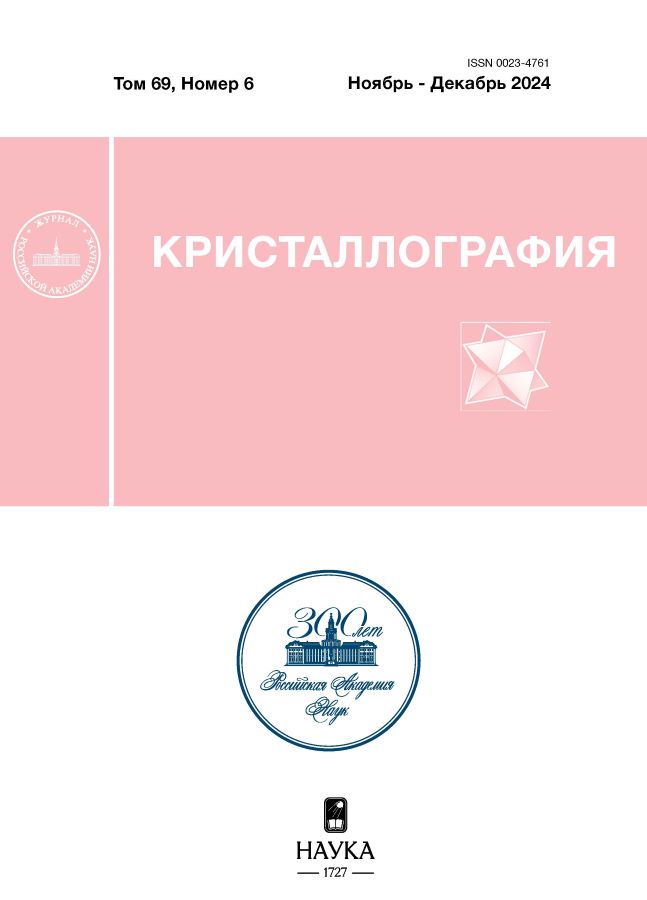Crystals of 4,7-bis(2,5-dimethyl-[1,1'-biphenyl]-4-yl)benzothiadiazole and Its Derivative with Terminal n-Hexyl Substitutes: Growth, Structure, Thermal and Absorption-Fluorescent Properties
- Authors: Postnikov V.A.1, Sorokina N.I.1, Yurasik G.A.1, Сорокин Т.А.1, Kylishov A.A.1, Lyasnikova M.S.1, Popova V.V.2, Svidchenko E.A.2, Surin N.M.2, Borshchev O.V.2
-
Affiliations:
- Shubnikov Institute of Crystallography of Kurchatov Complex of Crystallography and Photonics of NRC “Kurchatov Institute”
- Enikolopov Institute of Synthetic Polymer Materials of Russian Academy of Sciences
- Issue: Vol 69, No 6 (2024)
- Pages: 1044-1055
- Section: CRYSTAL GROWTH
- URL: https://ruspoj.com/0023-4761/article/view/673636
- DOI: https://doi.org/10.31857/S0023476124060159
- EDN: https://elibrary.ru/YGDNEY
- ID: 673636
Cite item
Abstract
This study presents an investigation into the crystallization and absorptive-fluorescent properties of linear conjugated molecules derived from 2,1,3-benzothiadiazole, specifically 4,7-bis(2,5-dimethyl-[1,1'-biphenyl]-4-yl)benzothiadiazole (Ph-Xy-BTD) and 4,7-bis(4'-hexyl-2,5-dimethyl-[1,1'-biphenyl]-4-yl)benzothiadiazole (Hex-Ph-Xy-BTD). The synthesis of a new derivative of Hex-Ph-Xy-BTD is described. It was found that the presence of terminal n-hexyl substituents in Hex-Ph-Xy-BTD leads to a lower melting point, increased solubility and has a positive effect on crystallization compared to Ph-Xy-BTD. Single crystals of Hex-Ph-Xy-BTD were grown from hexane solution, and their structure was elucidated using single-crystal X-ray diffraction, confirming a monoclinic system (space group P21/c, Z = 4). Absorption and fluorescence spectra were obtained and analyzed for solutions in tetrahydrofuran as well as for the crystals of Ph-Xy-BTD and Hex-Ph-Xy-BTD, alongside investigations of quantum yield and fluorescence lifetime.
Full Text
About the authors
V. A. Postnikov
Shubnikov Institute of Crystallography of Kurchatov Complex of Crystallography and Photonics of NRC “Kurchatov Institute”
Author for correspondence.
Email: postva@yandex.ru
Russian Federation, Moscow
N. I. Sorokina
Shubnikov Institute of Crystallography of Kurchatov Complex of Crystallography and Photonics of NRC “Kurchatov Institute”
Email: postva@yandex.ru
Russian Federation, Moscow
G. A. Yurasik
Shubnikov Institute of Crystallography of Kurchatov Complex of Crystallography and Photonics of NRC “Kurchatov Institute”
Email: postva@yandex.ru
Russian Federation, Moscow
Т. А. Сорокин
Shubnikov Institute of Crystallography of Kurchatov Complex of Crystallography and Photonics of NRC “Kurchatov Institute”
Email: postva@yandex.ru
Russian Federation, Moscow
A. A. Kylishov
Shubnikov Institute of Crystallography of Kurchatov Complex of Crystallography and Photonics of NRC “Kurchatov Institute”
Email: postva@yandex.ru
Russian Federation, Moscow
M. S. Lyasnikova
Shubnikov Institute of Crystallography of Kurchatov Complex of Crystallography and Photonics of NRC “Kurchatov Institute”
Email: postva@yandex.ru
Russian Federation, Moscow
V. V. Popova
Enikolopov Institute of Synthetic Polymer Materials of Russian Academy of Sciences
Email: postva@yandex.ru
Russian Federation, Moscow
E. A. Svidchenko
Enikolopov Institute of Synthetic Polymer Materials of Russian Academy of Sciences
Email: postva@yandex.ru
Russian Federation, Moscow
N. M. Surin
Enikolopov Institute of Synthetic Polymer Materials of Russian Academy of Sciences
Email: postva@yandex.ru
Russian Federation, Moscow
O. V. Borshchev
Enikolopov Institute of Synthetic Polymer Materials of Russian Academy of Sciences
Email: borshchev@ispm.ru
Russian Federation, Moscow
References
- Skorotetcky M.S., Krivtsova E.D., Borshchev O.V. et al. // Dye. Pigment. 2018. V. 155. P. 284. https://doi.org/10.1016/j.dyepig.2018.03.043
- Taylor D., Malcomson T., Zhakeyev A. et al. // Org. Chem. Front. 2022. V. 9. P. 5473. https://doi.org/10.1039/d2qo01316a
- Kostyuchenko A.S., Uliankin E.B., Stasyuk A.J. et al. // J. Org. Chem. 2023. V. 88. P. 5875. https://doi.org/10.1021/acs.joc.3c00286
- Kono T., Kumaki D., Nishida J.I. // Chem. Mater. 2007. V. 19. P. 1218. https://doi.org/10.1021/cm062889+
- Bei Q., Zhang B., Wang K. et al. // Chinese Chem. Lett. 2024. V. 35. P. 108438. https://doi.org/10.1016/j.cclet.2023.108438
- Bhagyanath P.K., Angela M., Asit H. // Mater. Adv. 2024. V. 5. P. 3323. https://doi.org/10.1039/d4ma00068d
- Postnikov V.A., Sorokina N.I., Kulishov A.A. et al. // ACS Omega. 2024. V. 9. P. 14932. https://doi.org/10.1021/acsomega.3c08543
- Surin N.M., Svidchenko E.A., Skorotetskii M.S. et al. // Russ. J. Phys. Chem. A. 2024. V. 98. P. 448. https://doi.org/10.1134/S0036024424030294
- Постников В.А., Юрасик Г.А., Кулишов А.А. и др. // Кристаллография. 2021. Т. 66. С. 967. https://doi.org/10.31857/s0023476121060266
- Sonntag M., Strohriegl P. // Tetrahedron Lett. 2006. V. 47. P. 8313. https://doi.org/10.1016/j.tetlet.2006.09.089
- Постников В.А., Сорокина Н.И., Кулишов А.А. и др. // Кристаллография. 2023. Т. 68. С. 120. https://doi.org/10.31857/S0023476123010228
- Postnikov V.A., Sorokina N.I., Kulishov A.A. et al. // Acta Cryst. B. 2019. V. 75. P. 1076. https://doi.org/10.1107/S2052520619012484
- Rigaku Oxford Diffraction. CrysAlisPro Software System: 1.171.39.46. Rigaku Corporation, Oxford, UK, 2018.
- Petrícek V., Dušek M., Palatinus L. // Z. Kristallogr. 2014. V. 229. P. 345. https://doi.org/10.1515/zkri-2014-1737
- Palatinus L. // Acta Cryst. A. 2004. V. 60. P. 604. https://doi.org/10.1107/S0108767304022433
- Demas J.N., Crosby G.A. // J. Phys. Chem. 1971. V. 75. P. 991. https://doi.org/10.1021/j100678a001
- Berlman I.B. Handbook of florescence spectra of Aromatic Molecules. 2d ed. N.Y.; London: Academic Press, 1971. 473 p.
- Уббелоде А.Р. Расплавленное состояние вещества. М.: Мир, 1969. 420 с.
- Kaminsky W. // J. Appl. Cryst. 2007. V. 40. P. 382. https://doi.org/10.1107/S0021889807003986
Supplementary files




















